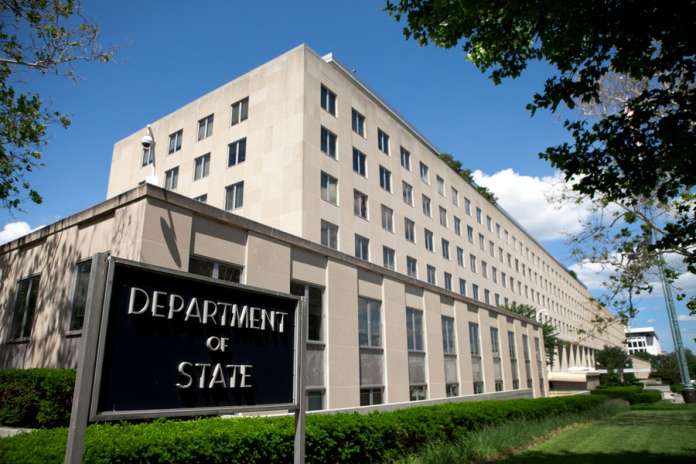The U.S. Department of State released the 2020 Country Reports on Human Rights Practices on Tuesday, March 30, during a press briefing led by Secretary of State Antony J. Blinken, reported the Armenian Assembly of America (Assembly).
Human rights violations against Armenians were outlined in the reports, particularly in relation to the Nagorno-Karabakh (Artsakh) war launched by Azerbaijan, with the full support of Turkey, against the Armenian people on September 27, 2020.
“Significant human rights issues” by Azerbaijan highlighted in the report included “unlawful or arbitrary killing; torture; arbitrary detention; harsh and sometimes life-threatening prison conditions…significant human rights issues connected with the Nagorno-Karabakh armed conflict…unlawful killings, civilian casualties, and inhuman treatment.”
The report noted that “the government did not prosecute or punish the majority of officials who committed human rights abuses and that “impunity remained a problem.” Honing in on human rights abuses, the report contained examples of two videos featured on social media last October of Azerbaijani soldiers “humiliating and executing two Armenian detainees in the town of Hadrut.”
The report goes on to state that the videos were assessed as “genuine” and “authentic” by independent experts from Bellingcat, the BBC, and the Atlantic Council’s Digital Forensic Research Lab. Another example listed was tied to an Amnesty International report that documented the “execution by decapitation of two ethnic Armenian civilians by Azerbaijani forces.”
Azerbaijan’s “use of heavy artillery missiles, combat unmanned aerial vehicles (UAVs), and aerial bombs, as well as cluster munitions, hitting civilians and civilian facilities in Nagorno-Karabakh” was also underscored in the report, noting that the Azerbaijani government “denied the accusations” that its military targeted civilian structures, despite the fact that the Human Rights Watch on October 3, 2020 and December 11, 2020 “criticized Azerbaijan’s armed forces for repeatedly using weapons on residential areas in Nagorno-Karabakh.”
Nonmilitary sites targeted included medical emergency service centers and ambulances, food stocks, crops, livestock, electricity and gas plants, and drinking-water installations and supplies, as well as schools and preschools. International observers reported that “Azerbaijani armed forces on multiple occasions struck near humanitarian organizations, such as The International Committee of the Red Cross (ICRC) and The HALO Trust, located in Stepanakert” and on October 14, 2020 “three aircraft reportedly dropped bombs on the military hospital in Martakert, damaging the hospital and destroying nearby medical vehicles, all clearly marked as medical.”
The report also cited that on November 2, 2020, the UN High Commissioner for Human Rights criticized Azerbaijan’s continuing attacks in populated areas in and around the Nagorno-Karabakh conflict zone, and quoted High Commissioner Michelle Bachelet, who stated “homes have been destroyed, streets reduced to rubble, and people forced to flee or seek safety in basements.”
A section on “abused soldiers and civilians by Azerbaijani forces” was rooted in “credible reports” and detailed the abuse based on the Human Rights Watch report published on December 2, 2020, that “Azerbaijani forces inhumanly treated numerous ethnic Armenian soldiers captured in the Nagorno-Karabakh conflict” and “Azerbaijani forces subjected the detainees to physical abuse and humiliation in actions that were captured on videos and widely circulated on social media.”
The number of missing persons and prisoners of war was documented in the report, citing the ICRC that “processed cases of persons missing in connection with the Nagorno-Karabakh conflict and worked with the government to develop a consolidated list of missing persons.”
Lastly, the report commented on the rise of “inflammatory rhetoric and hate speech against Armenians.” In his statement during the press briefing, Secretary Blinken emphasized that President Biden is “committed to putting human rights back at the center of American foreign policy” and that perpetrators of abuse will be held accountable. He noted that “human rights are universal” and that “all people are entitled to these rights.” The COVID-19 pandemic caused “alarming trend lines,” according to Secretary Blinken, which gave autocratic governments the opportunity to “further repress human rights.”
“Standing up for human rights everywhere is in America’s interest,” he said. “Standing for people’s freedom and dignity honors America’s most sacred values.” Secretary Blinken pledged to work with the U.S. Congress to sanction human rights violators and to “demonstrate a bipartisan commitment to promoting human rights.” He remarked that consequences would be imposed, including economic sanctions and visa restrictions if “autocratic institutions undercut human rights.”














